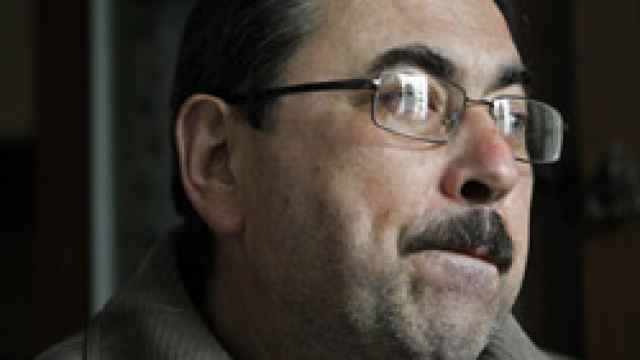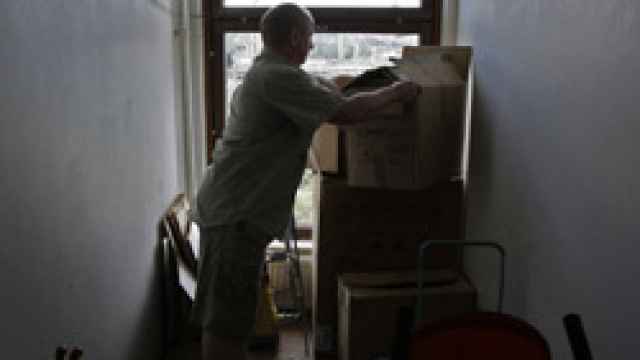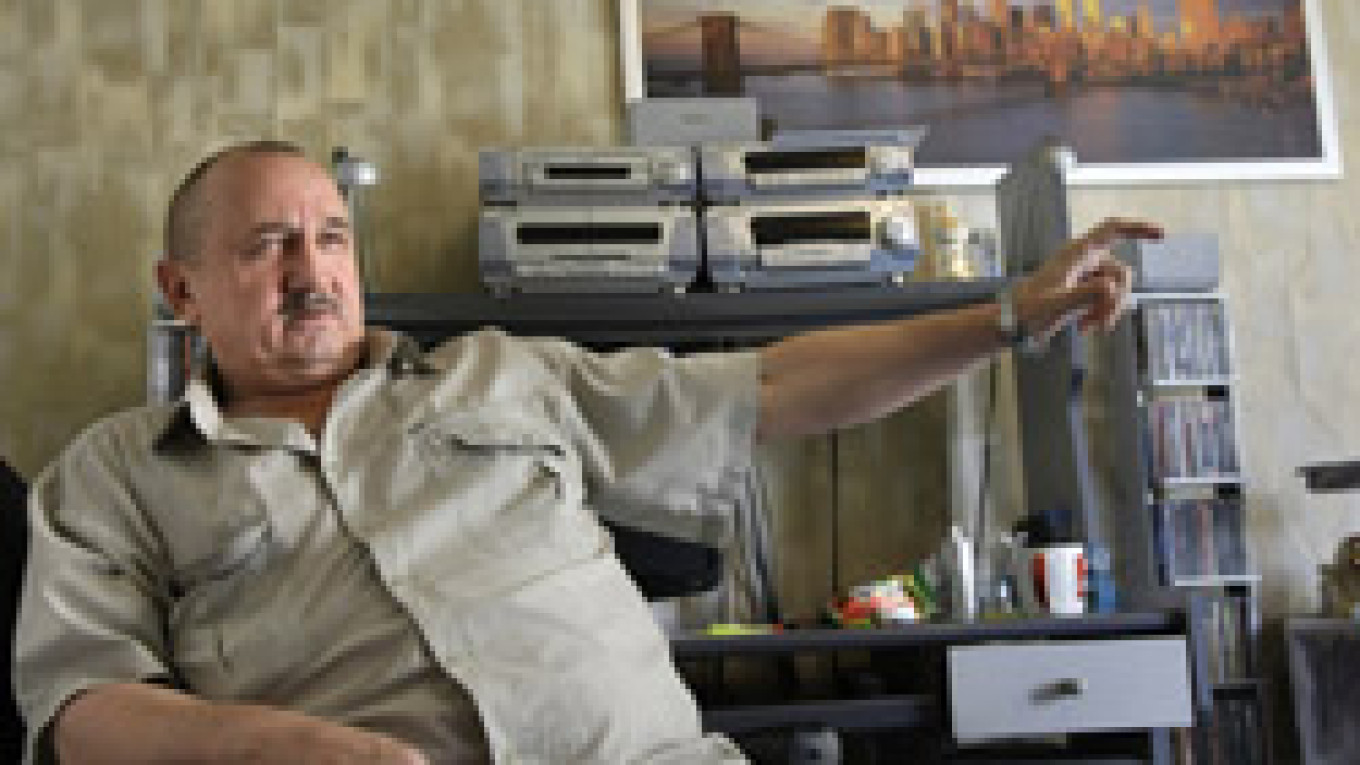KUBINKA, Moscow Region — Nikolai Kulikov, a 51-year-old officer, says bitterly that he gave his best years to the Russian army.
Kulikov did a series of assignments across the Soviet Union and spent the past 10 years as head of security at the Air Force base in Kubinka, 65 kilometers west of Moscow.
But now he is one of 200,000 military officers who face early retirement as the armed forces conduct a sweeping reform that will eliminate the jobs of six out of every 10 members of its top-heavy officer corps.
The government says reducing the ranks of senior officers is just one of the changes needed to turn an institution of more than 1.1 million personnel into a modern army trained to fight terrorism and regional conflicts. But many in this army town say the reform doesn’t take people into consideration.
“When I entered the army back in 1975, I thought I’d be given a certain kind of lifestyle, you know, stability, housing, status,” said Kulikov, sitting in the temporary two-room apartment he shares with his 23-year-old son. “But after two decades, I have nothing to show for it. This place is exactly the size of a jail cell.”

|
|
Misha Japaridze / AP
A line of barracks in Kubinka. Some 200,000 officers will be demobilized. |
Kulikov has been waiting for a new apartment for 13 years but claims he was removed from the waiting list several times because he angered his bosses. He also says corrupt officials are demanding $40,000 for his “free” apartment.
The reforms to the army were announced after Russia’s conflict with Georgia last year. The army was designed in the Soviet era to fight huge tank battles with NATO on the plains of Europe, and it had a surprisingly hard time crushing Georgia’s tiny, lightly armed military. The Georgians shot down at least four Russian aircraft in five days, leaving Prime Minister Vladimir Putin outraged.
But the government is not shrinking the size of the armed forces, the world’s fifth largest. As it reduces the number of senior officers, Moscow plans to increase military spending and promote or recruit more junior officers — molding a fighting force that more closely resembles that of the United States, among others.
Most critics of the restructuring recognize that it’s needed. But many here are worried about the backlash from, in effect, firing hundreds of thousands of officers at a time when the economy is shrinking and millions are already unemployed.

|
|
Misha Japaridze / AP
Solyakov, his wife and their 13-year-old daughter share a room in Kubinka. |
To soften the blow, the military is offering its retired officers a pension of about $400 a month and a free apartment. But many say they’ve been waiting for permanent housing for years and no longer believe in the government they spent decades defending.
“I feel very disappointed and bitter,” said retired Colonel Vyacheslav Solyakov, 51, smoking on the porch of the trailer his family has been living in since 2002. The trailer sits at the edge of a parking lot and is home to 12 families, who share two bathrooms and one kitchen. It was supposed to be temporary, but seven years later they are still there.
“During the upheaval, they needed the army to protect the country, but when we need the government it’s not there,” Solyakov said.

|
|
Misha Japaridze / AP
Kulikov called his temporary military housing “exactly the size of a jail cell.” |
Inside the trailer, the conditions are dire. Some rooms have mold on the wall, and most are only big enough to fit a bed and a small table.
“I feel totally betrayed,” said Solyakov’s wife, Nina. “On the weekends, when everyone is home, people have to stand in line to wash the dishes. It hurts to even think about it.”
Solyakov retired last spring. But like thousands of other families, the couple has been in limbo, living in temporary housing provided by the military while awaiting a permanent apartment. They share a small room with their 13-year-old daughter, Valeria, where the walls shake from the washing machine next door. Their 32-year-old son, also in the army, sleeps in the living room.
Military analysts say the reforms are painful but necessary.
“The system we have is hugely inefficient,” said Alexander Golts, a commentator who frequently speaks on military issues. “We have two officers overseeing one soldier. It can’t continue.”
It’s not clear what kind of help the government will provide beyond the pensions and promised apartments. More than two dozen training centers have already been opened around the country, but what they can actually accomplish remains to be seen, Golts said. Many officers’ skills are outdated, making it a challenge to transition them into the civilian work force.
“What they really need to do is issue a one-time payment of 180,000 rubles ($6,000) to make sure people don’t starve in the first couple of months,” he said.
Retired military officers have staged protests throughout the country in recent months, saying the reform is not well thought-out and will actually make the country more unstable.
Meanwhile, some younger officers are getting restless, too. Their meager salaries — about $250 a month — are hardly enough to support a family on, making a civilian career more tempting.
“Why should I torture myself on this job when I can earn five times more in a civilian post?” said Vladimir, a 27-year-old airplane technician who declined to give his last name because he feared retribution from his superiors. “If I don’t get my free housing by the end of the year, I’m leaving.”
A Message from The Moscow Times:
Dear readers,
We are facing unprecedented challenges. Russia's Prosecutor General's Office has designated The Moscow Times as an "undesirable" organization, criminalizing our work and putting our staff at risk of prosecution. This follows our earlier unjust labeling as a "foreign agent."
These actions are direct attempts to silence independent journalism in Russia. The authorities claim our work "discredits the decisions of the Russian leadership." We see things differently: we strive to provide accurate, unbiased reporting on Russia.
We, the journalists of The Moscow Times, refuse to be silenced. But to continue our work, we need your help.
Your support, no matter how small, makes a world of difference. If you can, please support us monthly starting from just $2. It's quick to set up, and every contribution makes a significant impact.
By supporting The Moscow Times, you're defending open, independent journalism in the face of repression. Thank you for standing with us.
Remind me later.


